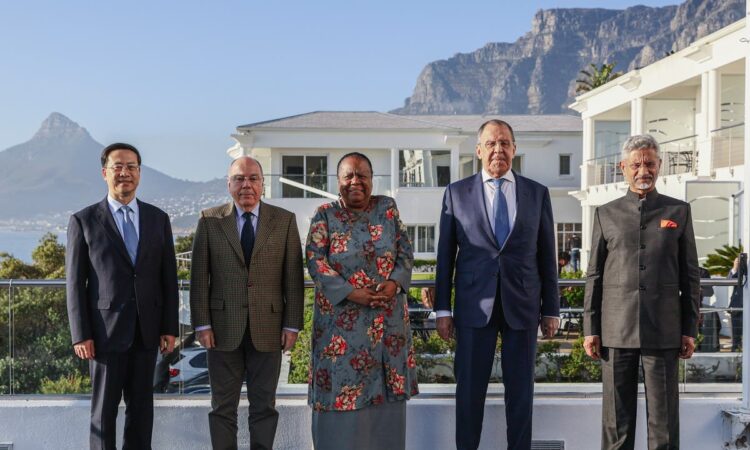
Ministers from more than a dozen countries, including Saudi Arabia and Iran, were in Cape Town on Friday for talks on establishing closer links with the Brics bloc of major emerging economies, as the group met with the intention of deepening ties and positioning itself as a counterweight to the West.
Brics – which for now consists of Brazil, Russia, India, China and South Africa – is considering expansion, and even the possibility of a new, common currency for international trade as an alternative to the US dollar in an effort to avoid the impact of sanctions over the war in Ukraine.
Once viewed as a loose association of disparate emerging economies, Brics has in recent years taken on a more concrete form, driven initially by China, and, since the start of the Ukraine war in February 2022, with added impetus from Russia.
The bloc was briefed by the New Development Bank, a Shanghai-based lender established by the Brics countries in 2015, about the potential introduction of alternatives to the currencies currently used for international trade, said Naledi Pandor, the foreign minister of host nation South Africa.
Without directly mentioning Russia, she said the aim was “to ensure that we do not become victim to sanctions that have secondary effects on countries that have no involvement in issues that have led to those unilateral sanctions”.
The bloc’s joint statement after the summit, which concluded on Friday, was titled “The Cape of Good Hope”.
“Ministers underscored the importance of encouraging the use of local currencies in international trade and financial transactions between Brics as well as their trading partners,” it said.
Topics high on the agenda included plans to admit new members to the bloc. Saudi Arabia, the United Arab Emirates, Egypt and Kazakhstan attended the summit after invitations were extended to them.
Ms Pandor said more work was needed to make the expansion possible. She hoped a report on the matter would be ready in time for the next summit, due to be held in August.
The Brics nations represent 3.2 billion people, or 40 per cent of the world’s estimated 8 billion population. The bloc is considered to be the primary geopolitical rival of the G7, which recently held its own annual summit in the Japanese city of Hiroshima.
Chinese vice foreign minister Ma Zhaoxu said the Brics group needs to be expanded in order to offer assistance to developing countries and emerging market economies.
Russian foreign minister Sergei Lavrov, who held bilateral talks on the sidelines of the summit with ministers from India and Saudi Arabia, said that “more than a dozen” countries, including Saudi Arabia, had expressed an interest in joining the bloc.
Naledi Pandor (left) and Sergei Lavrov are seen during a press conference at the Brics summit
(AFP via Getty)
Mr Lavrov’s arrival in the country was marked by protests against the invasion of Ukraine. Demonstrators held placards displaying the words “child murderer”.
His visit was overshadowed by the question of whether Russia’s president, Vladimir Putin, would be arrested if he attended the bloc’s August summit in Johannesburg.
Since a warrant was issued by the International Criminal Court (ICC) for Mr Putin’s arrest over allegations of war crimes in Ukraine, South Africa – a member of the ICC – would be required to detain the Russian leader if he were to attend.
“The president [Cyril Ramaphosa] will indicate what the final position of South Africa is. As matters stand, an invitation has been issued to all [Brics] heads of state,” Ms Pandor said.
Demonstrators protest against the war in Ukraine at a venue in which Russian and Chinese foreign ministers are set to meet with their counterparts from the Brics economic bloc
(AP)
Mr Putin has not confirmed whether he plans to attend the summit, with the Kremlin only saying that Russia will take part at the “proper level”.
The South African leadership is reported to be considering various options in an effort to avoid a potential diplomatic nightmare. These include holding the summit in another country, or making changes to South Africa’s laws.
Fielding a question about the possible change of venue for the August summit, Mr Lavrov was asked by a reporter, citing a British newspaper, if it could be held in the UK.
“As far as I understand, such news could have been published only in some yellow British newspaper,” replied the Russian foreign minister. “I don’t read British newspapers,” he quipped.
Alongside Iran and Saudi Arabia, a number of other countries have either formally applied to join the bloc or expressed an interest in doing so, according to officials. They include Venezuela, Argentina, Algeria and the UAE.
Foreign ministers representing the Brics countries expressed “concerns about the use of unilateral coercive measures, which are incompatible with the principles of the Charter of the UN and produce negative effects, notably in the developing world”.
They also called for a shift in the global order, away from Western nations and towards a more balanced distribution of power.
India’s foreign minister, Subrahmanyam Jaishankar, said the gathering must “send out a strong message that the world is multipolar, that it is rebalancing, and that old ways cannot address new situations”.
“At the heart of the problems we face is economic concentration that leaves too many nations at the mercy of too few,” he said, urging reform in global decision-making, including by the UN Security Council.
“Old ways cannot address new situations. We are a symbol of change. We must act.”
Brazil’s foreign minister, Mauro Vieira, called Brics an “indispensable mechanism for building a multipolar world order that reflects the devices and needs of developing countries”.



